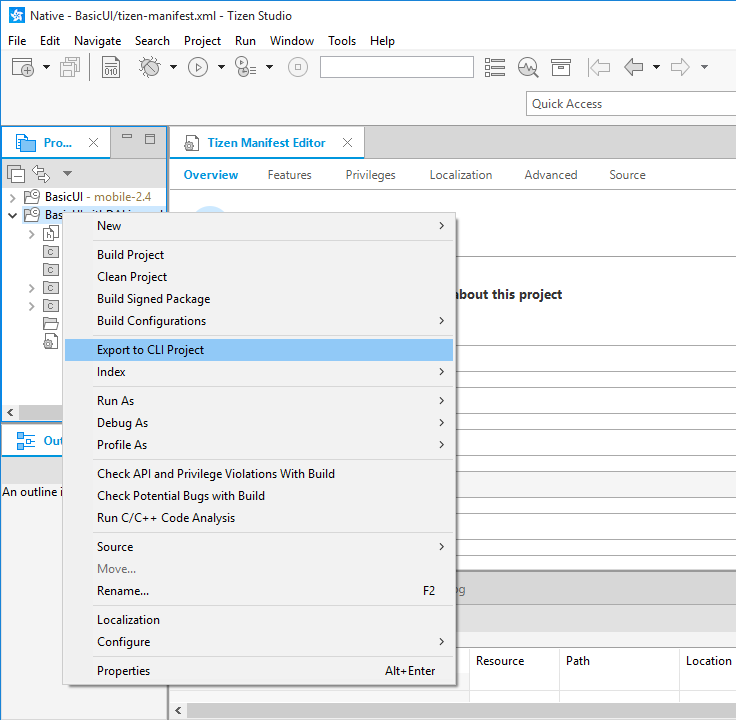Converting Projects for CLI
PUBLISHED
You can build a project, originally created with Tizen Studio, using the Command Line Interface (CLI).
Building a Tizen Studio Project on the CLI
To build a Tizen Studio project on the CLI, you must convert the project to a CLI project:
- In Tizen Studio, open the project you want to convert.
- Right-click the project and select Export to CLI Project.
An info dialog appears, and the
project_def.propandbuild_def.propfiles and theBuilddirectory are created.
Tizen Studio and CLI differ in how they describe the project properties and build configuration. The CLI uses the project_def.prop file for the project properties and the build_def.prop file for the build configurations. During export, the project_def.prop, build_def.prop, and the makefiles are added to the converted CLI project automatically.
Figure: Project conversion

About the project_def.prop File
The project_def.prop file describes the project properties, such as project type and list of source files. When you edit the properties in the project_def.prop file to manipulate the build or packaging process, use the following characters:
- "/" is a path separator character (in Windows®, Ubuntu, and macOS).
- "\" is a multi-line character, which is used at the end of each line.
- "\ " (backslash + space) is a space character, used in a path name that contains a space.
- "#" is a comment character.
Table: Project properties
| Property | Value |
|---|---|
APPNAME |
Application name, which must be given in lowercase letters.
For example: |
type |
Application type, which can be app, sharedLib, or staticLib.
For example: This is a readonly property; do not edit it. |
profile |
Profile with a version.
For example: |
USER_SRCS |
List of .c and .cpp source files in the current project.
The list can be used with wildcard characters: *. If there are more than 2 files, a white-space character separator is used. For example: |
USER_DEFS |
List of user-defined C files added to the compilation process.
The list must be used without the For example: |
USER_UNDEFS |
List of user-defined C files excluded from the compilation process.
The list must be used without the |
USER_CPP_DEFS |
List of user-defined C++ files added to the compilation process.
The list must be used without the |
USER_CPP_UNDEFS |
List of user-defined C++ files excluded from the compilation process.
The list must be used without the |
USER_LIBS |
List of library paths added to the linking process.
The list must be used without the |
USER_OBJS |
List of the .o file paths added to the linking process.
An absolute path can be available. |
USER_INC_DIRS |
List of reference paths for C and C++ compiling.
The list must be used without the For example: An absolute path can be available. |
USER_INC_FILES |
List of .h file paths for C.
The list must be used without the |
USER_CPP_INC_FILES |
List of .h file paths for C++.
The list must be used without the |
USER_LIB_DIRS |
List of reference paths for the library linking.
The list must be used without the |
USER_EDCS |
List of .edc file paths.
The list can be used with wildcard characters, such as *. If there are more than 2 files, a white-space character separator is used. For example: |
USER_EDCS_IMAGE_DIRS |
List of EDC reference paths for compiling, such as the -id option of Tizen Studio. An absolute path can be available. |
USER_EDCS_SOUND_DIRS |
List of EDC reference paths for compiling, such as the -sd option of Tizen Studio. An absolute path can be available. |
USER_EDCS_FONT_DIRS |
List of EDC reference paths for compiling, such as the -fd option of Tizen Studio. An absolute path can be available. |
USER_POS |
List of .po file paths.
The list can be used with wildcard characters, such as *. If there are more than 2 files, a white-space character separator is used. For example: |
About the build_def.prop File
The build_def.prop file describes some build configurations. You can run pre-build and post-build commands by describing the following properties.
Table: Build properties
| Property | Description |
|---|---|
PREBUILD_COMMAND |
Shell command executed before the project build. |
PREBUILD_DESC |
Description of PREBUILD_COMMAND. |
POSTBUILD_COMMAND |
Shell command executed after the project build. |
POSTBUILD_DESC |
Description of POSTBUILD_COMMAND. |
In addition, you can use some environment variables to describe the pre- and post-build commands.
Table: Environment variables
| Variable | Description |
|---|---|
PROJ_PATH |
Path of the project root directory |
BUILD_CONFIG |
Build configuration: Debug or Release |
BUILD_ARCH |
Architecture type: x86 or arm |
For example:
# Adding pre/post build command to build_def.prop
PREBUILD_COMMAND = mkdir ${PROJ_PATH}/${BUILD_CONFIG}/${BUILD_ARCH}/output
PREBUILD_DESC = Creating the output directory
POSTBUILD_COMMAND = rm -rf ${PROJ_PATH}/${BUILD_CONFIG}/${BUILD_ARCH}/tmp
POSTBUILD_DESC = Clean up the temporary resources
